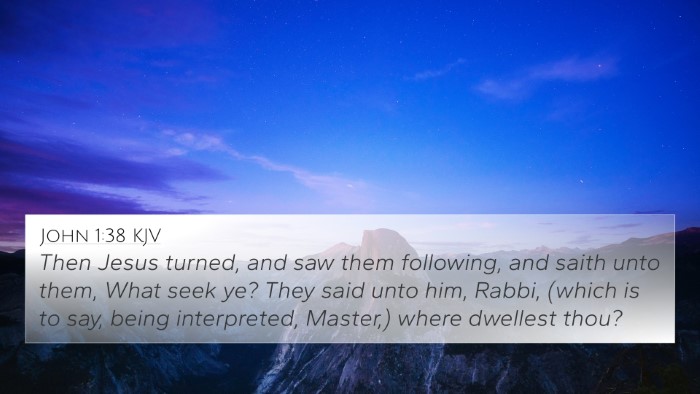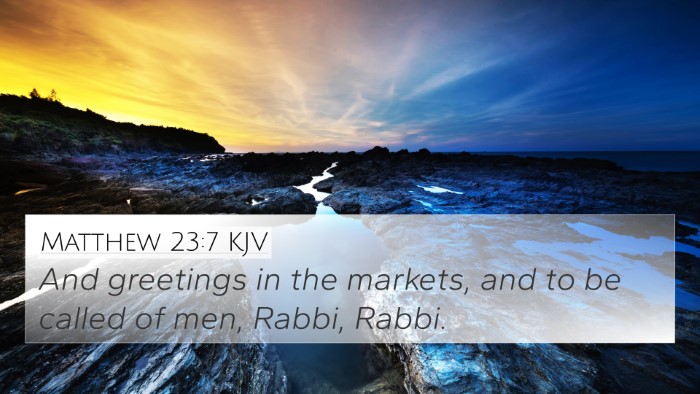Understanding John 6:25
John 6:25 states: "And when they found him on the other side of the sea, they said to him, Rabbi, when did you come here?" This verse captures a moment after the miraculous feeding of the 5,000, highlighting the curiosity and astonishment of the crowd who followed Jesus. It reflects the search for Jesus, a theme prevalent throughout the Gospels.
Contextual Significance
In the context of John 6, this verse comes immediately after the miraculous instance where Jesus feeds thousands with mere loaves and fishes. The crowd's inquiry not only emphasizes their desire to know more about Jesus but also sets the stage for deeper teaching on spiritual sustenance that follows.
Commentary Insights
- Matthew Henry: Henry emphasizes the significance of Jesus’ miraculous works, suggesting that the crowd’s question reveals their interest in understanding Jesus’ power. Their inquiry shows a physical search that contrasts with the spiritual nourishment Jesus will later clarify.
- Albert Barnes: Barnes notes the importance of the timing of this question, highlighting that the crowd was not merely seeking a miracle worker but engaged in a deeper inquiry about Jesus’ teachings and origins. The phrase "Rabbi" indicates their respect and acknowledgment of Jesus as a teacher, yearning for knowledge.
- Adam Clarke: Clarke suggests that this question reflects humanity’s constant pursuit of understanding divine occurrences. He notes that the crowd was following Jesus out of curiosity and perhaps desire for further miracles, indicating the complexity of their motivations for seeking Him out.
Thematic Connections
This verse serves as a pivotal point in understanding the dynamics of faith, sustenance, and revelation within Jesus’ ministry. It prompts readers to explore thematic connections throughout the Bible, particularly regarding the search for spiritual truth and understanding.
Bible Cross-References
To facilitate a comparative Bible verse analysis, here are some relevant cross-references that enrich the interpretation of John 6:25:
- Matthew 14:13-21: The account of the feeding of the 5,000, showcasing Jesus’ provision and the crowds’ response.
- John 6:26-27: Jesus’ response to the crowd's question, emphasizing the distinction between physical and spiritual nourishment.
- John 4:32-34: Jesus speaks of food that sustains spiritually, connecting physical hunger with deeper spiritual needs.
- Luke 2:46: The example of Jesus at the temple highlighting the significance of seeking understanding as a child.
- John 7:15-16: Further inquiries about Jesus’ teachings and authority, reinforcing the connection between seeking knowledge and understanding Jesus’ mission.
- Philippians 3:10: The pursuit of knowing Christ intimately aligns with the crowds’ desire to discover more about Him.
- Mark 6:53-56: The continual search and need for healing from Jesus, showing the crowd's constant desire for physical and spiritual intervention.
- Proverbs 2:3-6: This Old Testament wisdom highlights the importance of seeking knowledge, paralleling the seekers in this New Testament passage.
- Isaiah 55:1-3: An invitation to seek that which satisfies—the spiritual food that Jesus represents.
- 1 Corinthians 1:22-24: The Jewish demand for signs and the Greeks' search for wisdom contrasts with faith in Jesus as the ultimate truth.
Conclusion: The Pursuit of Understanding
Ultimately, John 6:25 illustrates the continuous human quest for truth and understanding in the wake of miraculous acts. It challenges us to examine our motivations for seeking Jesus—are we drawn merely by the miraculous, or do we yearn for a deeper relationship and understanding of His teachings? The cross-references provided serve as tools for Bible cross-referencing, guiding readers through inter-biblical conversations that contextualize and enrich their understanding of Jesus’ identity and mission.
Tools for Bible Cross-Referencing
Utilizing a Bible concordance or a cross-reference Bible study guide can assist readers in navigating these connections. Consider employing a Bible cross-reference system to deepen your studies, exploring the dynamics between verses and the overarching themes throughout Scripture.
Final Reflection
As we delve deeper into the scriptures, we uncover the vast interconnections between biblical texts. The thematic Bible verse connections found within John 6:25 encourage believers to seek spiritual nourishment that goes far beyond the physical—a lesson that remains relevant to our spiritual journey today.




